Nauticam announces their housing for Sony A7
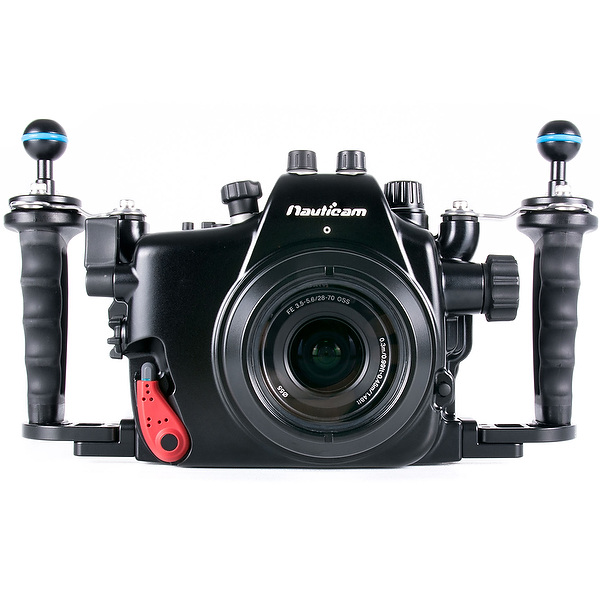
Nauticam has released details of their new housing for the Sony A7 and A7R cameras. The NA-7 has a switch that allows the user to choose either LCD or EVF and a Nikonos 5 pin bulkhead. Perhaps most interestingly, Nauticam are producing a Nikonos adaptor, allowing the use of the Sea & Sea 12mm fisheye or Nikonos 15mm lenses.
The NA-7 will be shipping from 31 January at a U.S.A. retail price of $2850.
Press release
Housing for Sony A7 and A7R
Innovation Underwater
Nauticam produces the world’s widest range of rugged aluminum underwater camera housings and related accessories. There are cameras to suit every photographer from very capable compacts to medium format to professional cinema systems. Of all of those cameras, there has never been one quite like the Sony A7 and it’s high pixel count sibling, the A7R. Sony has melded a full frame (36mm x 24mm) sensor into a camera body that is essentially the same size as many “compact” cameras. The result is a stunning blend of high resolution image quality and compactness.
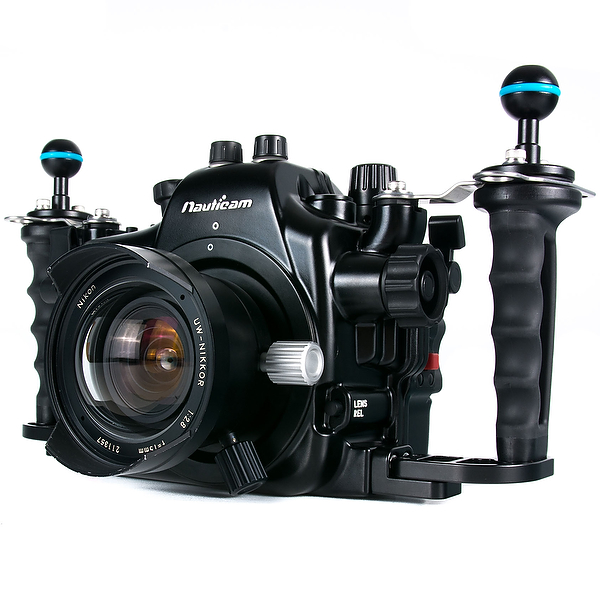
Sony A7R with Nikonos 15mm
From a distance, the Nauticam’s A7 offering looks like one of the company’s SLR housings, but looking closer, one can see that the Nauticam designers have managed to squeeze all of the engineering and ergonomics of those housings into a considerably smaller package. It only makes sense that the housing should be appreciably smaller than an SLR housing given that is one of the prime advantages of the camera.
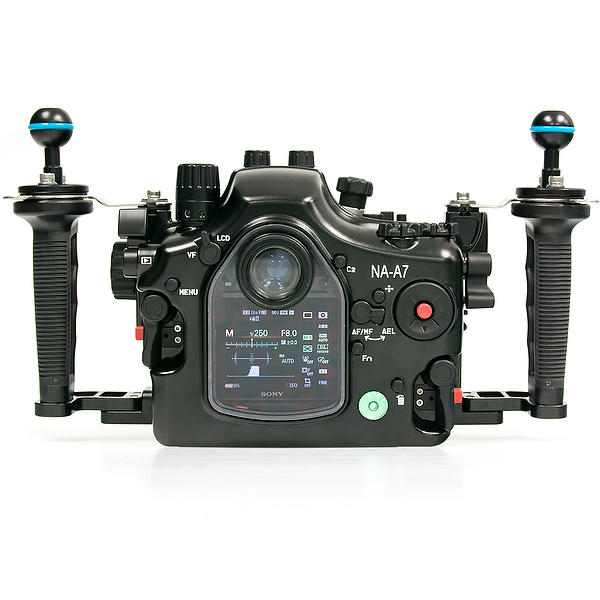
The NA-A7 Housing
The new housing for the A7 delivers on the promise of the A7: Full frame camera - small package. A new port system was designed for this camera… the SLR port opening was too large, meaning that the housing would be too large, and the existing mirrorless system port opening is too small for some of the lenses expected in the new Sony FE lens lineup. So, a new line of intermediate size ports is required and is being delivered with this housing.
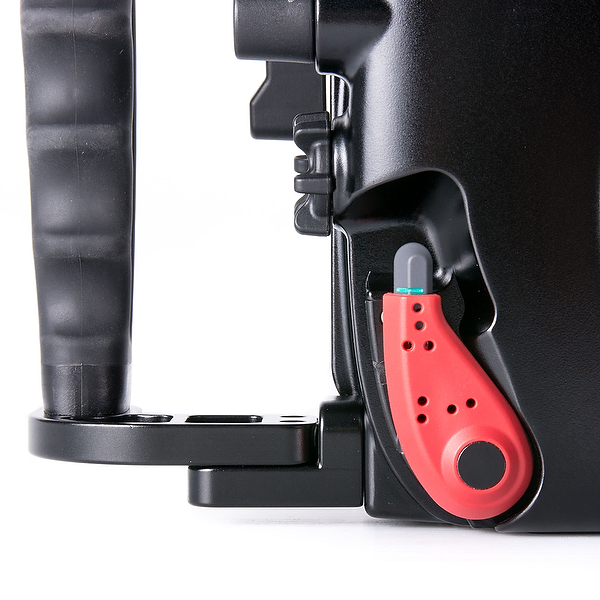
The housing and new port line would not be complete with the patented Locking Port Release system, which, like it does on other Nauticam housings, utilizes a unique internal bayonet system that locks the port securely without twisting or misalignment. The iconic red lever is easy to operate and lets the shooter know immediately that the port is securely locked in place. The user friendly housing latches are here as well, making this housing exceptionally easy to put together.
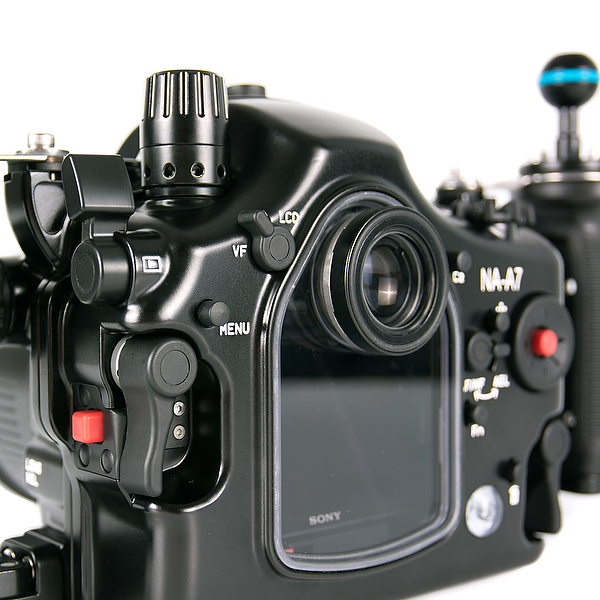
The patent pending EVF/LCD switch allows a quick way to alternate between using the large bright LCD display or the high resolution electronic viewfinder (EVF). The housing ships with a standard .66x viewfinder for the EVF, which is easily swapped out for either of the two Nauticam enhanced viewfinders.
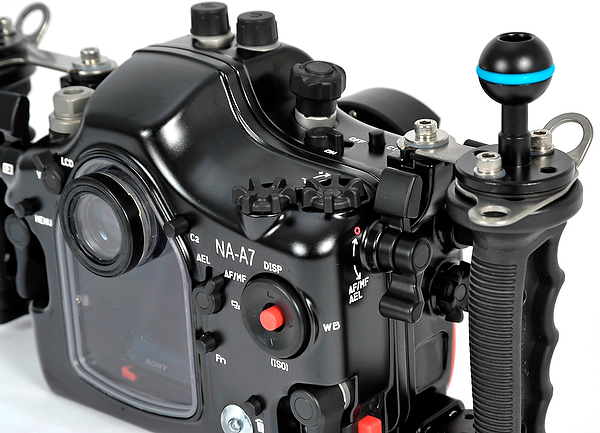
The NA-A7 includes a pre-installed Nikonos style 5-pin bulkhead with universal hotshoe connection (x and ground connection only) installed, enabling manual control of the most commonly available strobes, such as the Inon Z-240 or Sea&Sea YS-D1. Additional strobe firing options will be announced at a later date.
Integrated Electronic Vacuum Check and Leak Detection System
The NA-A7 ships with Nauticam’s new vacuum system with integrated electronic vacuum and leak detection monitoring system for extra piece of mind. A simple coded LED lighting system lets the user know that the watertight integrity is solid. The NA-A7 ships with a bulkhead port for installing the optional vacuum valves.
Key NA-A7 Features:
- Signature Nauticam Port Locking System: The iconic red locking lever is right at home on the NA-A7… lens/port changes made quick, easy and secure.
- SLR Styling with Handles Built In: The housing is designed to be used with the shooter’s hands on the handles, ergonomically placing the camera controls at just the right spot for easy use. No extra tray/handles to buy!
- Brackets: Laser cut stainless steel brackets reinforce the handles, making the rig sturdy and stable even with large strobes or video lights. Mounting balls are included, ready to attach strobes, video lights, and more.
- Vacuum System: The integrated vacuum check and leak detection system adds extra assurance of watertight integrity. Use it without an optional vacuum valve and it serves as a audible/visual water ingress detector. Add the vacuum valve, and get watertight integrity indication via a color coded LED light.
- LCD or EVF - Your Choice: The patented switch means either the LCD or EVF can be used and the shooter can instantly switch between them - underwater!
- EVF Viewfinder Options: For shooters wanting to take the ultimate advantage of the excellent OLED EVF in the A7, the renowned 180º Enhanced Viewfinder or the excellent 45º Enhanced Viewfinder are available. It takes less than a minute to change these viewfinders and no tools are required.
- Fingertip Control: Fingertip control for all key shooting controls, including both shutter release, focus lock, both command dials, and video start/stop. All of the controls are easy to operate, even with gloves on.
- Rubberized Zoom/Focus Knob: The new zoom/focus knob is now rubberized to make gripping easier and more comfortable. Nauticam is the only housing manufacturer offering over-molded, rubberized parts. Like previous Nauticam handles, the built-in NA-A7 handles get the rubberized treatment that so many shooters have come to enjoy.
- Nikonos Lens Support: Old meets new as the Nikonos lenses finally get matched up with a digital camera that is worthy of these legendary water contact lenses.
Despite the small size, this is a very easy housing to operate, even with gloves on. Every control is placed where a underwater shooter wants it - after all, the design team are underwater photographers themselves and strive to make every Nauticam housing the most ergonomic available. Each control, whether it is to change aperture or shutter speed, access the autofocus lock, change ISO, or even play back, is given consideration to minimize movement and make shooting easier.
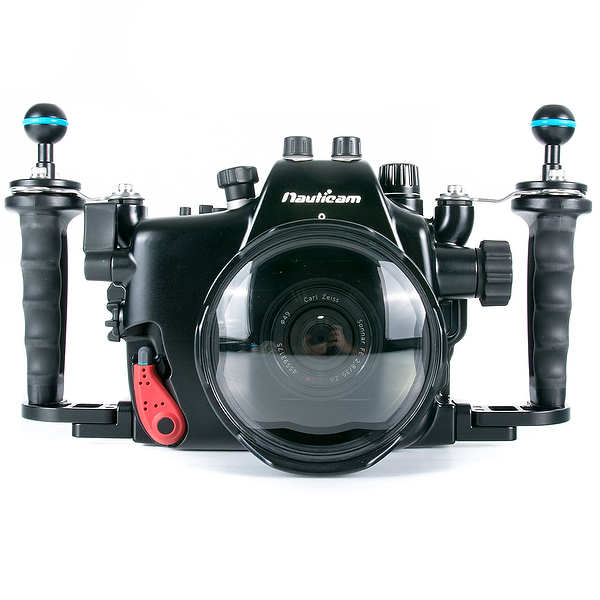
Of course, the sort of quality and robustness that has become synonymous with the Nauticam name is present with this housing as well. Milled from solid aluminum, the housing is depth rated at 100m and built to last. Exceptional care is taken to reduce any possibility of galvanic corrosion, and the housing is hard anodized to stay looking great after years of use.
The Sony Alpha A7 and A7R Cameras
Sony surprised the camera world 4 years ago by packing an APS-C sized sensor into a very small camera body. That camera was called NEX-5, and it helped usher in the age of mirrorless interchangeable lens cameras. Now they have done it again by packing a full frame sensor in a body that is only slightly larger than the popular NEX-7.
There is so much to be said about the A7 and A7R that it would take many pages to cover, but for underwater shooters, there are some key features that make these cameras stand out. The full frame sensor and very high image quality are just the beginning. The fast and accurate autofocus of the A7, the high pixel count of the A7R (though A7 is no slouch at 24 megapixels), bright, high resolution XGA OLED EVF, and 60p HD video will appeal to discerning u/w image makers.
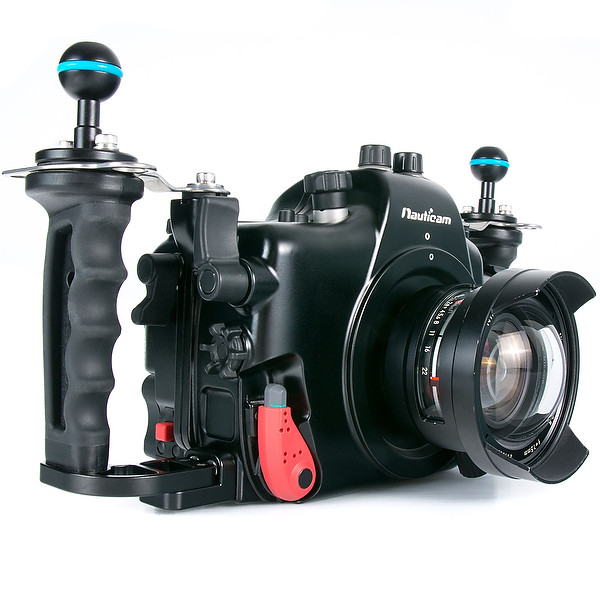
One interesting technical feature that Sony touts about these new cameras is a processor based algorithm that seeks to reduce the effect of diffraction on image quality when the aperture of the lens is stopped down. Assuming this works as Sony indicates, this could be useful for shooting macro with very high apertures, i.e. f/22 and above.
Choosing between the A7 and the A7R may be the most difficult part of looking at this new system. Which one? Sony sums it up like this:
“*The a7 is an excellent choice for a wide variety of shooting applications, and allows photographers to enjoy the benefit of full-frame photography in circumstances that would be challenging for other full-frame alternatives. The a7R is an excellent choice for photographers who require the very best image quality and resolution, and are willing to follow the workf